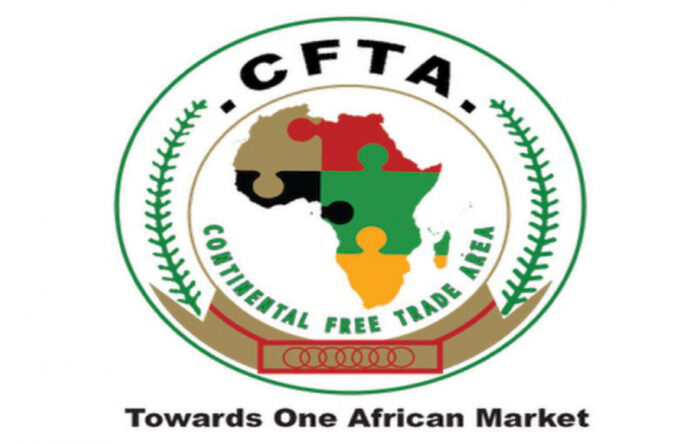The National Action Committee (NAC) on AfCFTA, says it has developed eight strategic pillars in line with the African Union’s framework for boosting intra-African trade.
Mr Francis Anatogu, the Secretary of the Committee said on Saturday in Abuja that the strategy was developed to achieve the African Continental Free Trade Area (AfCFTA) objectives.
He said that the first pillar focused on establishing the institutional framework to coordinate the multiple agencies in the public and private sectors involved in implementing provisions of the AfCFTA Agreement.
“On this pillar, our priority is to fulfil all national requirements to enable Nigerian business to commence trading under AfCFTA once the necessary legal documentation become available from the AfCFTA Secretariat.
“So far, Nigeria Customs Service has been designated as Nigeria’s Competent Authority for the administration of the rules of origin.
” With that, efforts are now underway to finalise the import and export processes, procedures and forms for the administration of AfCFTA rules of origin and gazetting of the legal documents to enable trade to commence,” he said.
According to him, the second pillar focuses on growing our production for export capacity to 50 billion dollars per annum.
Anatogu said this was being done by focusing on selected priority product value chains and on growing highly productive workforce to earn premium wages in Nigeria and Africa.
“We have identified our arrowhead, high potential and frontier products and services for AfCFTA.
“Considering Africa’s demand and our industrial policies set out in the national development plan, national industrial policy, zero oil plan and other sector policies.”
He said that AfCFTA with focus on trade of value-added products and services presents huge possibilities for state governments to grow their economies by attracting and supporting business focused on export trade.
According to him, subnational AfCFTA programme is already underway to support states to develop their strategies for AfCFTA.
Anatogu said that to this end, NAC Secretariat in collaboration with the Nigeria Governors Forum organised a three-day Subnational Strategy workshop on AfCFTA in November 2021.
“Over ten states have set up their Technical Working Group (TWG) on AfCFTA.
“Our charge to the states is to build an ecosystem around a specific product and service value chain to achieve a minimum of 1.2 billion dollars of exports by 2035.
“Another component of this pillar focuses on aggregating SMEs for AfCFTA. This programme involves working with aggregator companies and large companies to train and onboard SMEs into their supply chains.”
He said that the third pillar focused on trade facilitation, reducing time and cost of trade by simplifying, modernising and harmonising import and export processes and procedures.
Anatogu said that It also focuses on automation of administrative and regulatory compliance processes.
He said that the fourth pillar focused on. domesticating the AfCFTA agreement by updating trade and complementary policies regulations and laws to align with the provisions of the AfCFTA Agreement and to conform with contemporary practices.
“On this pillar, the review and update of Nigeria’s trade policy is underway led by the Nigerian Office for Trade Negotiations (NOTN).
“The national AfCFTA strategy has revealed a need to update and align the national industrial policy to the trade and investment policies in partnership with the United Nations Economic Commission for Africa,
“The NAC has commenced a project to define the requisite updates to our policies regulations and laws.
“It will also identify similar updates to request from our trading partners and define areas where we should pursue mutual recognition and cooperation agreements,” he said.
The secretary said that the fifth pillar would focus on trade infrastructure including energy, digital, water and logistics infrastructure to enable intra-Africa trade.
He recalled that Nigeria ranked 110 out of 160 countries assessed in the Global Logistics Performance Index in 2020.
This according to him is an evidence of the existing challenges in the quality of trade and transport infrastructure, ease of arranging competitively priced shipping, timeliness, and ability to track and trace shipments.
He said to achieve efficiency, reduce the time and cost required to move cargo and persons across the various transportation modes was an important enabler of trade competitiveness for Nigeria and, therefore, a critical imperative for Logistic and Supply Chain.
“Considering the magnitude of the deficit in infrastructure, innovative mechanisms are required to prepare for AfCFTA.
He listed some of the mechanisms to include cluster developments along trade corridors, leveraging eligible customer scheme and off-grid solutions for electricity in industrial zones and renewables for SMEs.
Anatogu said the sixth pillar focused on trade finance and involved configuring and strengthening financial service institutions and businesses for continental trade including financing export trade, providing banking, insurance and related services.
He said the seventh pillar focused on bridging the gaps in trade information, adding that this involved providing products and market information to the trading community.
The NAC secretary said that Nigeria had already signed up to the African Trade Observatory project which would collate trade statistics and other relevant information from all participating State Parties.
According to him, the eighth pillar will focus on facilitating mobility of Nigerian labour across Africa and market access.
“On market access, we will take deliberate steps to take Nigerian products and services to Africa leveraging innovative logistics solutions, creating strong national brand and matchmaking Nigerian businesses with their African counterparts.
“Also, as part of this pillar, is an AfCFTA export facilitation programme currently under development and which will involve profiling exporters for AfCFTA, conducting firm level needs assessment and providing firm specific facilitation support.
“In addition to all of the above, we have also embarked on a nationwide sensitisation programme, understanding that a foundation pillar for the successful implementation of the AfCFTA is awareness of the programme.




